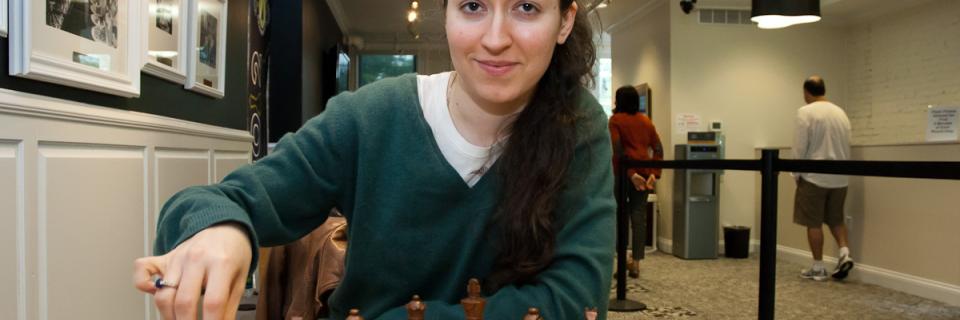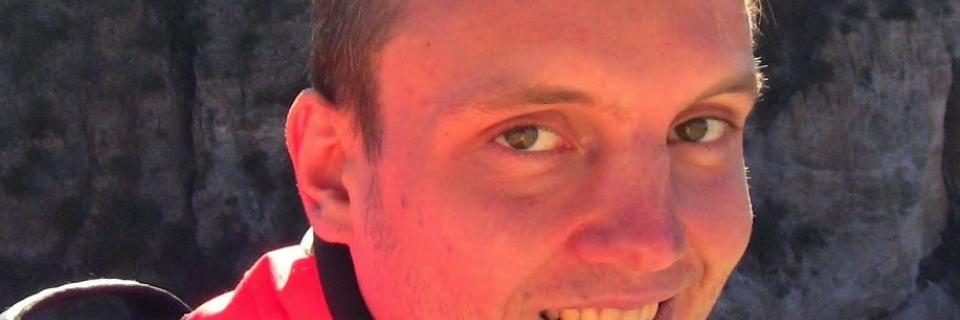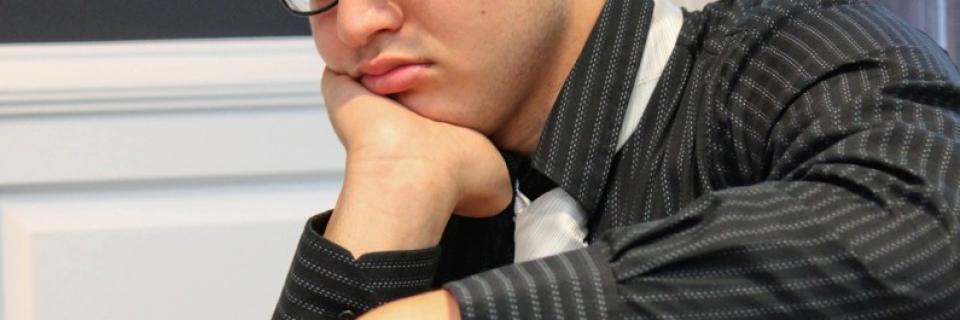2012 U.S. Championships News

By Mike Wilmering
SAINT LOUIS (May 1, 2013) -- It took 10 hours and 39 minutes for Grandmaster Timur Gareev to topple the final king and leave the chess community in Saint Louis dazed and amazed.
On Tuesday, GM Gareev put on a 33-board blindfolded simultaneous exhibition at the Chess Club and Scholastic Center of Saint Louis, scoring 29 wins, four draws and zero losses.
The field, composed entirely of Saint Louis Chess Club members, had an average USCF rating of 1363, and featured two experts, three class A players (1800-1999) and five class B players (1600-1799).
CCSCSL Executive Director Tony Rich (USCF 2020) was the highest-rated player in the field and one of only four players to draw the blindfolded virtuoso.
“It was a truly an amazing experience to witness this remarkable display of concentration and memory,” Rich said.
GM Gareev is working toward setting a new blindfold simul world record of 64 boards before the end of 2013. The date for the record-breaking simul is tentatively set for December 21 on the Hawaiian island of Oahu.
After switching federations from Uzbekistan to the U.S., he will be competing in his first-ever U.S. Championship. He enters the tournament as the No. 2-rated player in the field, second only to GM Gata Kamsky.
The 2013 U.S. Championship and 2013 U.S. Women’s Championship will be held simultaneously May 2 through May 13.
The participating players, their board numbers, and their current USCF ratings are as follows (the * denotes the players that played GM Gareev to a draw):
-
August Meyer: 987
-
* Steve Mislich: 1642
-
Lou Cotton: unr.
-
Ben Boaz: 1269
-
Joe Wojcki: 1817
-
Richard Pack: 1881
-
Ken West: 1269
-
Sal Falcone: unr.
-
* William Little: 1515
-
Ed Protzel: unr.
-
Joe Baur: unr.
-
Tim Baur: 487
-
Abdul Shakoor: 1176
-
Diamond Shakoor: 1259
-
Micah Losee: 1770
-
Julian Proleiko: 1735
-
Josh Cardenas: 1334
-
Jim Smith: 739
-
Preethi Kembaiyan: 1228
-
Yizheng He: 1160
-
Adam Eubanks: 1321
-
* Justin Hull: 1673
-
Sathya Anand: 1423
-
Katie Stujenske: 544
-
Willy Kane: 1871
-
Alex Marler: 2012
-
Adonis “Mark” Reddick: 1548
-
* Tony Rich: 2020
-
Sarah Crawford: 476
-
Jonathan Lake: 581
-
Richard Pointer: 1594
-
Brian Jerauld: 1762
-
Ben Simon: 1437
The average was derived from the 29 rated players with the four unrated players omitted from the calculations. Of the four unrated players, only Ed Protzel is not a current USCF member.
The 2013 U.S. Championship and 2013 U.S. Women’s Championship will be held simultaneously May 2 through May 13. This marks the fifth consecutive year that each of these prestigious events will be held in Saint Louis.
The opening ceremony takes place on May 2, and the first round for both events will kick off at 1 p.m. CT on May 3.
Also, fans of the U.S. Chess Championships can participate in Fantasy Chess for free by visiting: http://www.uschesschamps.com/2013-fantasy-chess. The grand prize is round-trip airfare for two from anywhere in the continental U.S., two nights hotel, a private dinner with GM Yasser Seirawan and two private lessons with Seirawan as well.
 IM Irina Krush seeks to defend her title against a determined field, including IM Anna Zatonskih, another four-time U.S. Women's Champion.
IM Irina Krush seeks to defend her title against a determined field, including IM Anna Zatonskih, another four-time U.S. Women's Champion.
By Brian Jerauld
Did you hear that Anna Zatonskih is playing in the 2013 U.S. Women’s Championship? Anna Zatonskih is playing in the 2013 U.S. Women’s Championship. Thoughts?
Thanks for letting me know.
You two might be one of the best rivalries in chess today. You smacking your king across the room in 2008 was epic – re-lived more than 60,000 times on YouTube. Off camera, there is a rumor you left that chess board and jumped into a pool, fully clothed. Confirm/deny? What are your thoughts on that moment, six years later?
Yes, I jumped into a pool. That's why my hair is wet in the closing ceremony pictures. I think I had the presence of mind to take off my shoes, though. No point ruining those because of temporary insanity. Why does everyone love to remember that "epic" playoff? Was it really that exciting? :)
You once stated that your WGM title is the only chess title that you didn’t ask or apply for. What are your feelings about being issued a title that exists exclusively for women? How do you feel about competing in tournaments that are exclusively for women?
Right, I don't see a point in separate women's titles, because women are fully capable of achieving regular titles. But I don't see any problem in competing in women's-only tournaments. I suppose you could eliminate them too, with the idea of eliminating professional female chess players, because realistically it's hard for women to compete with men at the very top levels. I wouldn't be one saying it's "unfair" if things like the Women's World Championship, Olympiad, World Team, etc., were abolished, because I'm sure with the right combination of hard work and talent, there would eventually be someone of Judit's caliber, but I'm guessing it would be a blow to the already not huge pool of women who pursue chess seriously. With more tournament opportunities, which make it possible to earn a living, the number and level of women in chess has really risen in the last twenty years. It is not like women are getting weaker by playing women-only tournaments once in a while. Rather, there's a motivation to stay in the game and improve because they can realistically hope to make a living from it.
You were born in and lived in Odessa, Ukraine, until you were five (four and a half, actually). You recently returned there for the first time since leaving in 1988. What was that like?
I went back to Odessa for the first time in September 2012 after the Olympiad in Istanbul and spent five days there. I was very happy to come back to the city I was born in; I had always identified with it. To prepare myself, I read a book called "Odessa: Genius and Death in a City of Dreams", a kind of biography of the city. Not a million pages long, because the city itself was only founded in 1794 by a decree of Catherine the Great! From the beginning, Odessa was a cosmopolitan city. And there is an amazing fact: all the people who laid the foundations of the city of Odessa were foreign-born! The main street of Odessa is called "Deribasovskaya" after Jose de Ribas, a general in Catherine's army who is considered Odessa's founder, another main thoroughfare- Richelievskaya, after the Duc de Richelieu, Odessa's first city administrator. Odessa is a beautiful city; the center is just gorgeous, like a small European capital. And it has the advantage of being by the sea, having beaches and a perfect climate in September... But even though Odessa is in my roots, I'm a Brooklyn girl. :)
You may have heard that chess is the hip, new thing in St. Louis. In fact, you recently visited Washington D.C. to help declare Saint Louis the chess capital of the U.S. When are you moving here?
Ah, yes. I was waiting for the invitation. Well, it's not easy to coax me away from my little nest in Brooklyn-I have my whole life here: my family, friends, and work-but I told Tony I'd be up for a stint as a resident GM at the Chess Club for a month or so. I do love Saint Louis! It has so many good memories for me. But you know, just thinking about it, I felt how much I'd miss New York ...

By Mike Wilmering
SAINT LOUIS, April 29, 2013 -- On Tuesday, April 30, Grandmaster Timur Gareev will conduct a 33-board blindfolded simultaneous exhibition at the Chess Club and Scholastic Center of Saint Louis (CCSCSL). The event will help kick off the 2013 U.S. Championships, scheduled to be held in Saint Louis May 2 through May 13.
GM Gareev will meet and greet simul participants at 8 a.m. CT, and the simul will begin at 9 a.m. He is working toward setting a new blindfold simul world record of 64 boards before the end of 2013. The date for the record-breaking simul is tentatively set for December 21 on the Hawaiian island of Oahu.
CCSCSL Executive Director Tony Rich said the blindfold simul presents a perfect exhibition to demonstrate how chess can positively impact students.
“This remarkable demonstration of concentration and memory will help drive home the many and varied scholastic benefits chess has to offer,” Rich said.
After switching federations from Uzbekistan to the U.S., GM Gareev will be competing in his first-ever U.S. Championship. He enters the tournament as the No. 2-rated player in the field, second only to GM Gata Kamsky.
The 2013 U.S. Championship and 2013 U.S. Women’s Championship will be held simultaneously May 2 through May 13. This marks the fifth consecutive year that each of these prestigious events will be held in Saint Louis. The opening ceremony takes place on May 2, and the first round for both events will kick off at 1 p.m. CT on May 3.
Also, fans of the U.S. Chess Championships can participate in Fantasy Chess for free by visiting: http://www.uschesschamps.com/2013-fantasy-chess. The grand prize is round-trip airfare for two from anywhere in the continental U.S., two nights hotel, a private dinner with GM Yasser Seirawan and two private lessons with Seirawan as well. For the first time in the five years the CCSCSL has hosted the event, organizers are bringing in three commentators to provide even more extensive live coverage of the games and more in-depth player interviews and post-game analysis. GM Yasser Seirawan, GM Maurice Ashley and WGM Jennifer Shahade will provide live play-by-play coverage.
 GM Alejandro Ramirez, a Samford Fellowship recipient last year, is hoping the investment in his game will pay dividends at this year's tournament.
GM Alejandro Ramirez, a Samford Fellowship recipient last year, is hoping the investment in his game will pay dividends at this year's tournament.
By Brian Jerauld
You have a Masters in Arts and Technology, specializing in video game design, and you worked on Diablo III – which was released during the 2012 Championships. You were concerned then that it would be “difficult to handle both things.” How much of a distraction was the game release with last year’s tournament?
Honestly, I couldn't contain my excitement with the release of Diablo III last year. The project was of such scale and, although my contribution was of course very small, it was still extremely exciting to see my name on the credits of a Blizzard AAA release. I was able to play a few hours [the night of the release] and I didn't go to bed until rather late that night. Fortunately I played a very interesting game and didn't lose the next day. It's been a constant for me that the more fun I'm having during tournaments and the more distracted I am the better I tend to do. In tournaments where I stress myself out or prepare for months, I seem to do mediocre at best. My Wizard is happily level 60 now and she shouldn't be any sort of distraction this year though :)
Do you feel like your approach in preparation is different this time around? Without a new video game impending to take the world by storm, you must have a boost in focus. How do you prepare for this large of a tournament?
This tournament is certainly different than last year. This year, unfortunately, there are many distractions that are preventing me from having the full preparation I would've liked. For example, I am just returning from Hamburg, Germany, where I was recording two new Chessbase DVDs (one dealing with the anti-Benko setups for White and one as a hypermodern repertoire for White). Although still technically chess it's not the strong preparation I would like to do. On the other hand, I'm benefited by the format of this year since with 24 players it is difficult to prepare against everyone beforehand. This year has been far from ideal for me in chess terms, and although my last tournament was a nice success I'm a little wary about how my play will be in Saint Louis.
You’ve expressed how much you enjoy your degree and would love to work for it. But being an active GM is a full-time job, too, and last year you spoke about being conflicted with the decision between the two. Where are you at now with that decision? Do you think it’s possible to do both?
I had the fortune of being chosen as one of the two 2012 Samford fellows. This was a huge blessing as it allowed me to focus on chess more and not make a decision right away. Of course since I accepted the fellowship it is my duty to dedicate more efforts towards the chess world, and that is what I'm doing right now. I still try to keep up with video games, and I will try to be attending some important conferences in the future (GDC next [Game Developer's Conference] is conveniently going to be in Los Angeles right before Blizzcon in Anaheim, so I will most likely do both). The more I see it the more difficult I believe it will be to be a full professional chess player and a game designer at the same time, but I do hope that I'm able to keep both up at least at some level for many years.
Were you home-schooled once you started rising in chess? How much chess was integrated into your schooling, and how do you feel about a larger chess presence in the U.S. education system?
I was home-schooled as soon as I finished 7th grade in Costa Rica. It wasn't just to dedicate more time to chess, it was also to avoid the slow tempo that was sung in the traditional education system. Once I was home-schooled I immediately starting learning programming, back with Visual Basic 6. I also started taking up chess more seriously, and was able to learn more about architectural drawing thanks to my dad since he had the patience to teach me. At some point I became less diversified and with my travels I was certainly forced to do so. Chess became my entire life when I was around 13 and up until the point I became a GM. Overall I believe that had I remained in the traditional school system I would still be in Costa Rica with nowhere near the opportunities I currently have.
I think the education system everywhere needs some important overhauls. I believe that adding chess is a good start as it gives the students an interesting way to engage their brains rather than the monotonous math and science classes they have to go to. As part of my game design education we had a lot of philosophical debates on exactly why 'play' was useful for people. One of the works we read was by M.J. Ellis and the book's title is 'Why People Play'. The book gives a critical analysis on what 'play' is, why people crave it and how it is beneficial to society. In essence, play is natural for young people as it is the way they prepare for the future. It is important to stimulate independent thinking, the ability to plan and analyze forward, the ability to cope with defeat, the ability to do quick calculations, and it is obvious that chess provides the perfect scenario in which to practice these and many other important day-to-day skills by playing.
You’ve credited your father for a lot of your early chess. Do you have any experiences to share? When did you first beat your dad, and what was that like? What kind of chess relationship do the two of you have today?
I'd like to point out that it wasn't just my father that was responsible for my chess growth, without my mom's cunning and ability to find tournaments when information was still scarce on the internet - not to mention an efficient way to get us there - it would have been impossible for me to ever become a GM. I honestly don't remember when the first time I beat my dad was, but it might have been before I ever played my first real chess tournament. My dad's rating must not be much higher than 1000. He understands the psychology behind the game perfectly better than most GMs, and has a keen understanding on how the mind works and how we use it to retrieve information - he understands Dvoretsky but probably couldn't solve a four-move checkmate. His is a mind that is more unique than any I have yet to encounter.
My favorite story of his is probably our experience in 2004 Cappelle la Grande. I was already a GM-elect and had been offered full conditions to participate in the tournament, including hotel. We had requested beforehand that I get a double room since my dad was traveling with me, and to our surprise they told us that this was impossible: the rooms were only for chess players. However they offered as a solution, they would give us the double room for free as long as my father played in the tournament! So for the first time in his life my dad played a huge international open! Halfway through the tournament my dad had really gotten into it, he had lost a few games but had actually managed to score a victory. I remember preparing for my game (I was having a dreadful tournament) and of course I had to dedicate a fair amount of energy to preparing for my games, but my dad kept insisting I teach him the 'Modern' defense as he was unhappy with the positions he kept getting from the opening! It is funny how tournaments can creep into you. I think he was very pleased with his result at the end. I think he finished with a solid 2.5/9 after he offered a 6-year-old kid called 'Francois' a draw after my dad had taken all his pieces!
My dad and I still talk often, but of course it's hard to be as close as we were since the distance is enormous and I'm consistently busy. It's one of the biggest downsides to my moving to the U.S.
 GM Marc Arnold had a big 2012, winning the U.S. Junior Closed Championship, securing the grandmaster title and beginning his first year of college at Indiana University.
GM Marc Arnold had a big 2012, winning the U.S. Junior Closed Championship, securing the grandmaster title and beginning his first year of college at Indiana University.
By Brian Jerauld
Your invitation to the 2013 U.S. Championships comes as a result of you winning the 2012 U.S. Junior Closed Championship. How, if at all, has your approach to the game changed since that time? Do you feel pressure to perform because this is a bigger stage?
My approach to the game has not changed much. I just try to play my game no matter what. I've played in some pretty competitive events before so I don't feel too much pressure; I just want to play to the best of my ability
You graduated high school and took a one-year break before entering Indiana University in 2012. What was the year off like? What did it do for your chess career, and your life?
I think that the year off was beneficial. It helped me mature as a person and get me ready for college. I achieved the grandmaster title which was important to my chess career as well as gaining experience in tougher tournaments.
How has your experience been at Indiana, so far? What degrees are you interested in? Do people around campus know you are a Grandmaster?
My experience at Indiana has been great so far. I'm interested in business, maybe finance. I'm not totally sure yet. Some people around campus know that I'm a grandmaster and most of my friends know.
How do you think your gift at chess has shaped your young life? What kind of doors has it opened for you?
Chess has been a huge part of my young life. it has definitely had a huge impact on me in a good way. It's opened many doors for me. I would say that people respect chess and the people who play it. It is assumed that if you are good at chess you are a smart person.
Do you see chess in your long-term future, i.e. after graduation?
I want to continue playing chess for the rest of my life. I doubt I will be a professional chess player, but I want to continue to play in tournaments whenever I get the chance to.
The USCF lists your first tournament as the Walter Stiern Tournament in Bakersfield, CA on Jan. 8, 2000. Since then, you have played in a tournament nearly every month for 13 years – even picking up that pace over the past couple years. So, do you like chess, or what?
Yes, I like chess. Honestly, I played a lot more tournaments when I was younger than now. I play chess for aesthetic purposes, but I also played to learn about myself. I express myself in chess. I play my own moves. I like the creative aspect of chess, without that it'd be boring.
Do you have a limit to how much chess you can take in a day? Do you ever get sick of chess? What do you do to “get away?”
I'm hardly addicted to chess. I hardly ever play or study. I do often play chess variants though, namely bughouse and Tempest Chess. I also like basketball.
Are there any additional non-chess realted interests?
I'm interested in acting, business, economics, and entrepreneurial endeavors in general.
Your stepfather is GM Enrico Sevillano. How important has he been to your chess development?
He came into my life when I was 1800. What I've taken away from him is his encouragement to play deep and study more. I've learned some of his openings, and just his presence and interactions with me profoundly affected my analytical process.
Some people argue that becoming elite in chess means you’re born with something special. Do you feel special? Or are you just proof that anything can be done with a little dedication?
I feel special, but I'll feel less special if I get blown away here. Hopefully, I'll make a strong showing!

